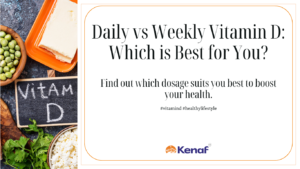
Vitamin D: Understanding its Role in Fighting Infection by boosting immunity naturally
Vitamin D is a fat-soluble vitamin that has been shown to play a crucial role
in the body’s defense against infections. This essential nutrient is known for
its impact on bone health, but its role in the immune system has been
gaining increasing attention in recent years.
How Vitamin D Supports Immunity
The immune system defends the body from foreign, invading organisms,
promoting protective immunity while maintaining tolerance to self. Vitamin
D can modulate the innate and adaptive immune responses. Vitamin D
helps regulate the immune system by stimulating the production of white
blood cells, which play a crucial role in fighting off infections. Vitamin D
plays an important part in the innate antimicrobial response by increasing
production of peptides with potent bacterialcidal activity such as
cathelicidins and defensins. Additionally, vitamin D helps reduce
inflammation, which can suppress the immune system and make it more
susceptible to illness and infection.
The Connection Between Low Vitamin D Levels and Infections
There have been multiple cross-sectional studies associating lower levels
of vitamin D with increased rate of infection. One of the study demonstrated
that individuals who had lower vitamin D levels lost significantly more days
from active duty secondary to upper respiratory infections than individuals
with higher vitamin D levels.
Respiratory Tract Infections: Studies have shown that Vitamin D may help
to reduce the risk of upper respiratory tract infections, such as the common
cold and flu.
Tuberculosis: Low Vitamin D levels has been linked to an increased risk of
tuberculosis, a bacterial infection that primarily affects the lungs.
Thus, low serum Vitamin D levels is associated with increased
autoimmunity as well as an increased susceptibility to infection.
Why low serum Vitamin D levels is Common?
Despite its importance, many people are deficient in vitamin D, particularly
in countries with limited sun exposure. Factors that contribute to a vitamin
D deficiency include:
Lack of Sun Exposure: Vitamin D is synthesized in the body when the skin
is exposed to sunlight.
Limited Vitamin D-Rich Foods: The average diet may not include enough
foods that are rich in vitamin D, such as fatty fish, eggs, and mushrooms.
Poor Absorption: Certain medical conditions, such as obesity, and lifestyle
factors can interfere with the body’s ability to absorb vitamin D.
Tips to Increase Vitamin D Levels
Sun Exposure: Spend at least 15-20 minutes in the sun every day,
especially during the between 10 am to 3pm.
Diet: Eat a balanced diet that includes foods rich in vitamin D, such as fatty
fish, eggs, and mushrooms. Here are some nutritious sources that help to boost
your Vitamin D absorption such as avocados, nuts, seeds, full fat dairy products, and
eggs.
Supplements: In case you are unable to get your daily requirement through
the diet, taking a vitamin D supplement can be beneficial as supplements
are as effective and natural as taking a sun exposure.
Kenaf’s Vitamin D3 Nutrasolos is a natural, instant mouth dissolving and a
convenient way to maintain your serum Vitamin D levels and it may be best
if you can get in the routine of taking your Vitamin D supplement with a
nutritious breakfast.
In conclusion, vitamin D plays an important role in the body’s defense
against infections. By understanding its impact on the immune system, we
can work to reduce the prevalence of vitamin D deficiency and improve
overall health and well-being.
Disclaimer:
Thank you for reading our blog. If you have any questions or concerns, please contact us
through our website.
The information provided on this blog is for general informational purposes only. The information
provided on this blog is not intended to be a substitute for professional medical advice,
diagnosis, or treatment. Always seek the advice of your physician or other qualified health
provider with any questions you may have regarding a medical condition. Never disregard
professional medical advice or delay in seeking it because of something you have read on this blog.
Reference: Vitamin D and immune system, J Investig Med. 2011 Aug; 59(6): 881–886.





[…] Vitamin D, commonly known as the “sunshine vitamin,” plays a vital role in maintaining a…. For individuals seeking to meet their Vitamin D needs, the choice between daily supplementation or weekly high-dose intake (e.g., 60,000 IU) is an important one. In this blog, we’ll explore the benefits and safety considerations of daily Vitamin D supplementation compared to weekly high-dose supplementation. […]
[…] How Vitamin D Boosts Immunity: […]
[…] Boosts Immunity: Vitamin D plays a role in regulating the immune system and may help prevent ce… […]